God, the brain and black holes - Exploring the conceptualisations of time in the realms of Philosophy, Biology and Astrophysics
by Victoria Rodner and Rosa Levandovski
São Paulo, April 21, 2015
Day II (April, 21) of talks at Intercontinental Academia (ICA) and we are stimulated yet again by a variety of disciplines, scholars, and approaches to the issue of time. From religion to the origin of the universe, from the circadian rhythm to Realist and Relativist ontologies, attendees at ICA are invited to broaden their horizons as they dive head first into rich and diverse new fields of research.
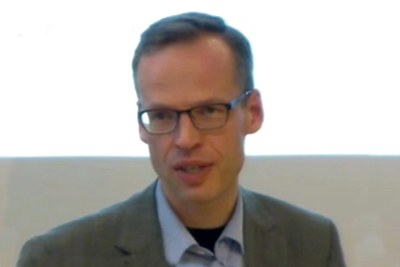 We start the day with Professor Sami Pihlström from Helsinki Collegium for Advanced Studies in Finland, who presents the issue of Time from a Philosophical standpoint. A Professor of Practical Philosophy, Pihlström delves straight into the metaphysics of time and temporality, with his talk entitled Time & Eternity, where he considers whether time is an objective truth (and therefore ‘real’) or a socially constructed concept, as argued by Kant’s transcendental idealism. Prof Pihlström leads us seamlessly through the philosophies of physics, history and religion and how these various approaches provide us with a variety of conceptualisations pertaining to Time. In his talk, he presents us not only with these varied conceptualisations on Time, but also with the contested issue of ‘eternity’, asking the public whether or not this concept can even be considered (in philosophical or scientific terms) coherent. Ancient philosophers argued that the natural world around us was in fact eternal (although always in flux). However from a Judeo-Christian standpoint, we are given a much more linear framework of time, where there is a palpable beginning and an apocalyptic end to world as we know it. Despite this inevitable ‘doom’ promulgated by some organised religion, there is a belief of an eternal life after our time on earth. Beyond this dichotomy, Prof Pihlström highlights notions that appear eternal, for instance numbers and mathematical truths, propositions from philosophers, abstract entities, and perhaps even the concept of God as an omnipresent being. What I found most interesting of Prof Pihlström’s talk was the notion of personal motivation and time. In his seminal essay of 1973, moral philosopher Bernard Williams noted how an eternal life would in fact become tedious (what he calls the ‘tedium of immortality’), as the ability to do everything within a continuous ‘lifetime’ would in fact make us indistinguishable from others, who also had an eternal lifetime to achieve everything we had achieved, concluding therefore that an eternal life would in fact be demotivating. It would be interesting to consider this notion further and explore how various cultures (with different philosophical or religious underpinnings) differ in their motivation given their conceptualisation of time. This was a thoroughly interesting talk on the issue of time and brought up some very thought-provoking questions from the audience.
We start the day with Professor Sami Pihlström from Helsinki Collegium for Advanced Studies in Finland, who presents the issue of Time from a Philosophical standpoint. A Professor of Practical Philosophy, Pihlström delves straight into the metaphysics of time and temporality, with his talk entitled Time & Eternity, where he considers whether time is an objective truth (and therefore ‘real’) or a socially constructed concept, as argued by Kant’s transcendental idealism. Prof Pihlström leads us seamlessly through the philosophies of physics, history and religion and how these various approaches provide us with a variety of conceptualisations pertaining to Time. In his talk, he presents us not only with these varied conceptualisations on Time, but also with the contested issue of ‘eternity’, asking the public whether or not this concept can even be considered (in philosophical or scientific terms) coherent. Ancient philosophers argued that the natural world around us was in fact eternal (although always in flux). However from a Judeo-Christian standpoint, we are given a much more linear framework of time, where there is a palpable beginning and an apocalyptic end to world as we know it. Despite this inevitable ‘doom’ promulgated by some organised religion, there is a belief of an eternal life after our time on earth. Beyond this dichotomy, Prof Pihlström highlights notions that appear eternal, for instance numbers and mathematical truths, propositions from philosophers, abstract entities, and perhaps even the concept of God as an omnipresent being. What I found most interesting of Prof Pihlström’s talk was the notion of personal motivation and time. In his seminal essay of 1973, moral philosopher Bernard Williams noted how an eternal life would in fact become tedious (what he calls the ‘tedium of immortality’), as the ability to do everything within a continuous ‘lifetime’ would in fact make us indistinguishable from others, who also had an eternal lifetime to achieve everything we had achieved, concluding therefore that an eternal life would in fact be demotivating. It would be interesting to consider this notion further and explore how various cultures (with different philosophical or religious underpinnings) differ in their motivation given their conceptualisation of time. This was a thoroughly interesting talk on the issue of time and brought up some very thought-provoking questions from the audience.
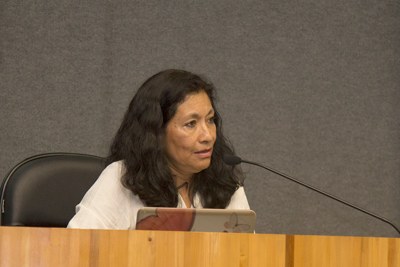 From philosophy we move swiftly into biology with a talk by Professor Carolina Escobar from the Universidad Nacional Autonoma de Mexico (UNAM). In her talk, Biological Time & the Dangers of a Disrupted Rhythm, Prof Escobar gives a compelling account of how our modern ways have in fact broken prevailing circadian biorhythms and are having detrimental effects on the human body and psyche. She asserts that, from a scientific standpoint, we are all in fact exposed to the effects of time and thus the concept is real and not socially construed. Although we are bound to a linear passing of time (from our birth to our death), our bodies rely on natural annual, monthly or daily cycles that are in constant repetition. However, modern man has ignored these natural cycles with the invention of clocks and unnatural light to break away from our day/night dependency and manipulate our conceptualisation of time. Prof Escobar’s area of expertise revolves around the biological clock (or suprachiasmatic nucleus located in the hypothalamus of the brain) and her current research interest focuses on not only the exposure to natural and unnatural light, but also the effects of food on our circadian rhythm. Thanks to an alleged dominance over nature, humans are able to break these natural rhythms of night and day (having lights and entertainment at night, eating during the night, working nights, and so on) which is known as circadian dyssynchrony and gives the body the wrong signals. Prof Escobar advocates for circadian health in order to keep our biological clocks functioning, meaning that we should try to follow natural time cycles more closely to ensure physical and mental health. She gives a vivid example of her recent research at a neo-natal ICU where premature infants who had night / day cycles (versus constant exposure to light) showed significant weight gain and improved health compared to those who ‘ignored’ these circadian cycles. In her style and her content, Prof Escobar was able to capture the attention of any scholar in the room, scientist and social scientist alike, as her research is both coherent and thoroughly convincing to all.
From philosophy we move swiftly into biology with a talk by Professor Carolina Escobar from the Universidad Nacional Autonoma de Mexico (UNAM). In her talk, Biological Time & the Dangers of a Disrupted Rhythm, Prof Escobar gives a compelling account of how our modern ways have in fact broken prevailing circadian biorhythms and are having detrimental effects on the human body and psyche. She asserts that, from a scientific standpoint, we are all in fact exposed to the effects of time and thus the concept is real and not socially construed. Although we are bound to a linear passing of time (from our birth to our death), our bodies rely on natural annual, monthly or daily cycles that are in constant repetition. However, modern man has ignored these natural cycles with the invention of clocks and unnatural light to break away from our day/night dependency and manipulate our conceptualisation of time. Prof Escobar’s area of expertise revolves around the biological clock (or suprachiasmatic nucleus located in the hypothalamus of the brain) and her current research interest focuses on not only the exposure to natural and unnatural light, but also the effects of food on our circadian rhythm. Thanks to an alleged dominance over nature, humans are able to break these natural rhythms of night and day (having lights and entertainment at night, eating during the night, working nights, and so on) which is known as circadian dyssynchrony and gives the body the wrong signals. Prof Escobar advocates for circadian health in order to keep our biological clocks functioning, meaning that we should try to follow natural time cycles more closely to ensure physical and mental health. She gives a vivid example of her recent research at a neo-natal ICU where premature infants who had night / day cycles (versus constant exposure to light) showed significant weight gain and improved health compared to those who ‘ignored’ these circadian cycles. In her style and her content, Prof Escobar was able to capture the attention of any scholar in the room, scientist and social scientist alike, as her research is both coherent and thoroughly convincing to all.
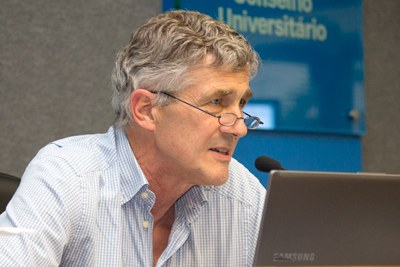 After lunch, we are introduced to Professor Ruud Buijs, colleague of Prof Escobar at UNAM. Known to insiders as ‘the brain man’, Prof Buijs as a Neurobiologist goes into further detail on the biological clock and how it is crucial for the human body to function. Through empirical research, he demonstrates how the brain prepares the body for hormonal activity, including the intake of food. These stages of bodily activity can be altered if the food source shifts, as he shows in the example of Finnish bats tending to fly less at night in the winter months because of a lack of food source. Prof Buijs goes on to explain how seasonal shifts affect not only food sources and hence eating patterns, but also sexual activity in the animal kingdom. Closer to home, he argues that there is a clear link between sleep duration and obesity, so that a disturbance of the biological clock can even develop diseases such as Type 2 Diabetes and Obesity in humans. As these UNAM scholars presented their research over the two sessions, ICA attendees were presented with a stimulating and well-researched account of the issue of time from a biological point of view.
After lunch, we are introduced to Professor Ruud Buijs, colleague of Prof Escobar at UNAM. Known to insiders as ‘the brain man’, Prof Buijs as a Neurobiologist goes into further detail on the biological clock and how it is crucial for the human body to function. Through empirical research, he demonstrates how the brain prepares the body for hormonal activity, including the intake of food. These stages of bodily activity can be altered if the food source shifts, as he shows in the example of Finnish bats tending to fly less at night in the winter months because of a lack of food source. Prof Buijs goes on to explain how seasonal shifts affect not only food sources and hence eating patterns, but also sexual activity in the animal kingdom. Closer to home, he argues that there is a clear link between sleep duration and obesity, so that a disturbance of the biological clock can even develop diseases such as Type 2 Diabetes and Obesity in humans. As these UNAM scholars presented their research over the two sessions, ICA attendees were presented with a stimulating and well-researched account of the issue of time from a biological point of view.
Worlds apart but equally stimulating, Professor Hideyo Kunieda from Nagoya University presents us with Time in Astronomy. As an astrophysicist, Prof Kunieda’s talk centres round the role of physics in the understanding of time. In preparation for next year’s event (March 2016), Prof Kunieda took the opportunity to briefly present Nagoya University and its areas of scholarly expertise to the public.
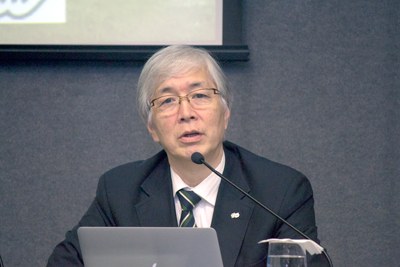
Dividing his talk into three distinct areas, Prof Kunieda covers the issues of a definition of time, the history of the universe (or cosmological time) and the theory of relativity. Hearing Prof Kunieda’s talk made me regret my lack of knowledge in this particular field and wish I had taken the time to read my copy of Hawking’s A Brief History of Time or at least some of Michio Kaku’s work so as to better appreciate the vast subject matter of the talk. Nevertheless, Prof Kunieda gave a convincing presentation where he aimed to capture the enormity of his subject in a nutshell. His particular area of expertise lies in taking x-ray photographs of the universe to explain the cosmos and give us a better understanding of the concept of time. Guiding us through (not-so-simple) equations, charts, diagrams, and breath-taking photographs of stars and blackholes, Prof Kunieda concluded that time as a unit was determined by the earth’s rotation and orbit, that the time axis is converted to depth of the universe, and that space and time are units of examination in the universe.
We have ended the day today, following a wonderful sunset with Professor Till Roenneberg, from the Institute of Medical Psychology, Ludwig-Maximilian-University, Munich, Germany (LMU), who brought together an interactive, philosophical, and biological talk into the field of Chronobiology. Once again we had to switch our minds to the field of the biological sciences. Sitting on a red stool, at the center of the auditorium, Prof Roenneberg started his talk with an experiment, where he invited us to close our eyes as he asked us some simple questions. Firstly, the audience was asked to point out where some things were located in the room, forcing us to use our memory if not our imagination. After a series of questions, the last one was related to the day before: where was the sunset? Being part of this didactic experience, made us think more carefully of time and space. The assumption behind it (the fact that most of our answers were right) was not thanks to our memory, but in fact because our brain provides us with a model related to space and time.
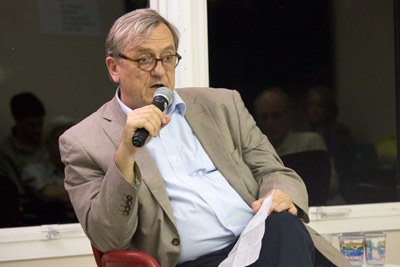
After this introductory experiment, Prof Roenneberg became more provocative; setting the idea that the circadian clock does not in fact resemble an actual clock at all. To explain this, he went into some detail on Darwin’s theory of biological evolution of the species, giving us some vivid examples. At that time we had to switch on again, to philosophical concepts of evolution, stating that all organisms arise and develop through the natural selection of small variations allowing the individual's ability to survive. What we know as the circadian clock is therefore not really a clock, but can be used as a clock as it works as a model that allows the representation of time and space for organisms. Biological rhythm works as the rest of the universe does, as an example of the laws of physics anticipating or predicting what will happen next. The concepts of entrainment give us the evidence that the Suprachiasmatic Nucleus (SCN), in animals and humans, can be adjusted by the light-dark cycle. Although the blind are physically unable to distinguish these cycles, they can be synchronized using melatonin, the hormone responsible for entrainment, which takes place in the SCN. Moving to the contemporary period, Prof Roenneberg stated that our industrialized civilizations are now suffering from a phenomenon known as a Social Jet Lag, where the circadian clock has difficulty with entrainment. As the internal circadian system is organized by the Sun’s clock (not by the social clock) the reality we face today is that up to 85% of the industrialized civilization relies on the alarm clock to wake up in the morning, meaning that the majority of the population is forced to wake up before their internal circadian clock is ready to do so, thereby breaking the natural rhythm of the human body. Social Jet Lag can be measured by the discrepancy between internal biological times, work time, to the external social times and leisure time. Throughout the talk, the young researchers had the opportunity to discuss their ideas with Prof Roenneberg in what an very stimulating and dynamic presentation.
Today’s talks were peppered with brief presentations from the young researchers who have been invited to the conference to share their research interests with fellow academics. Also a group meeting was arranged between the young researchers, critical rapporteurs and audio-visual rapporteurs to discuss ways of disseminating the work of each participant (via videos posted online) and how to make the most of the ICA event as a platform for research.
